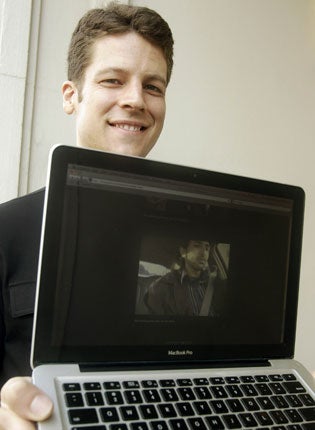Crime victims become hi-tech detectives to trace stolen gadgets

One of the most famous faces on the internet at the moment belongs to a taxi driver who has been exposed as a thief in a very modern case of digital sleuthing that is helping aggrieved geeks and gadget owners to be reunited with their stolen goods.
From Surrey to San Francisco, software is doing the job of the police as vigilantes use tracking programmes more commonly seen in CIA action thrillers to locate missing computers and phones. In April, the ex-England rugby captain Will Carling traced his stolen iPad to a block of flats in Woking. He knocked on all the doors – to no avail – then traced its movement through the town while detailing the chase on Twitter. The iPad was eventually handed in to local police.
The guilty taxi driver stole a laptop belonging to Joshua Kaufman in Oakland, California, last month. What he didn't know was that Kaufman had installed software that activated the machine's built-in camera. When police told Kaufman they didn't have the resources to find his laptop, he spent four weeks gathering photos and location data using a software package called Hidden. He presented this evidence to the police but got no reply so posted pictures of the thief staring at the screen to his blog, where they went viral and were viewed by millions. It wasn't until a US news show contacted Oakland police to ask them about Mr Kaufman's post, that they sprung into action – more than 10 weeks after the theft.
"It's these kind of partnerships that make things happen," said an officer to Mr Kaufman, glossing over the fact that their action was prompted largely by a national broadcaster.
Pioneering geeks realised years ago that remote access services – such as LogMeIn.com and Apple's "Back To My Mac" – could allow them to spy on the activities of the person who had connected to the internet using their stolen machine; this idea was extended by software such as Absolute's LoJack For Laptops and Orbicule's Undercover, which made the process more clandestine, by regularly sending location data, screengrabs and webcam pictures.
Since November last year, owners of iPads and recent models of iPhone have had access to a free feature called "Find My iPhone"; after enabling it on the device, its location can be pinpointed by logging into a website, and it can also be sent messages, locked down, or its contents erased completely. You may have precise knowledge of where your laptop is, but if the police are are too busy to follow it up, your choices seem to be limited to knocking on the door yourself (inadvisable unless you're a former rugby player, perhaps) or turning to the media for help.
The publicity surrounding Mr Kaufman's laptop and, before that, Carling's iPad, has led to a surge of interest in Hidden and similar software packages, which can only be a good thing; even if a stolen device cannot be retrieved, at least data can be protected by remote locking or erasing.
Absolute's LoJack software perhaps offers the most sensible answer to worries about misplaced heroics or vigilante action after a theft; the company deals with the police on your behalf, and doesn't tell you the location of the your item once it's reported stolen.
"I read about a case recently where a person encountered someone with an iPhone in the vicinity of where their stolen one was supposedly located," says Absolute's general manager Dave Everett. "They beat up that person and they ended up being prosecuted. They had no idea of the forensics – but our tools are approved by ACPO (the Association of Chief Police Officers) and analyse the data in greater detail."
The taxi driver in the Kaufman case would have been thankful for this approach; he may well have purchased the stolen machine innocently, but he's now been cyber-branded as a thief.
Lost and found
The iPad pursuit
A former England sports star might find the public more than willing to help with a search for their stolen property, but Will Carling took matters into his own hands in February, detailing on Twitter his journey around Woking looking for his missing iPad. "Can't believe this," he wrote. "[It's] now showing it near the station round the back of some shops – has it been dumped???" It was handed in to Woking police.
The indestructible smartphone
In March this year, US Air Force sergeant Ron Walker accidentally dropped his iPhone out of a plane flying at approximately 1000ft. After logging in to Apple's Find My iPhone service he was surprised to find it emitting a signal; it was eventually found, fully intact, lying next to a tree in dense forest in North Carolina. "It looked like someone had sat the phone down and walked away," said Walker.
The stolen car
Last October, a woman in Cincinnati had her car stolen as she popped into a dry cleaners. She'd left her mobile phone in the car, and police were able to gain access to the phone's GPS facility; the driver was tracked as he made his way through town (making purchases using the credit card as he went) and was eventually arrested.
The Twitter vigilante
Last month, Canadian web analyst Sean Power used a software package called Prey to retrieve details of a laptop thief, which he posted on Twitter; a number of his online acquaintances followed the culprit around New York, with one finally confronting him in a bar and persuading him to hand over the item. Power decided not to press charges.
Subscribe to Independent Premium to bookmark this article
Want to bookmark your favourite articles and stories to read or reference later? Start your Independent Premium subscription today.

Join our commenting forum
Join thought-provoking conversations, follow other Independent readers and see their replies